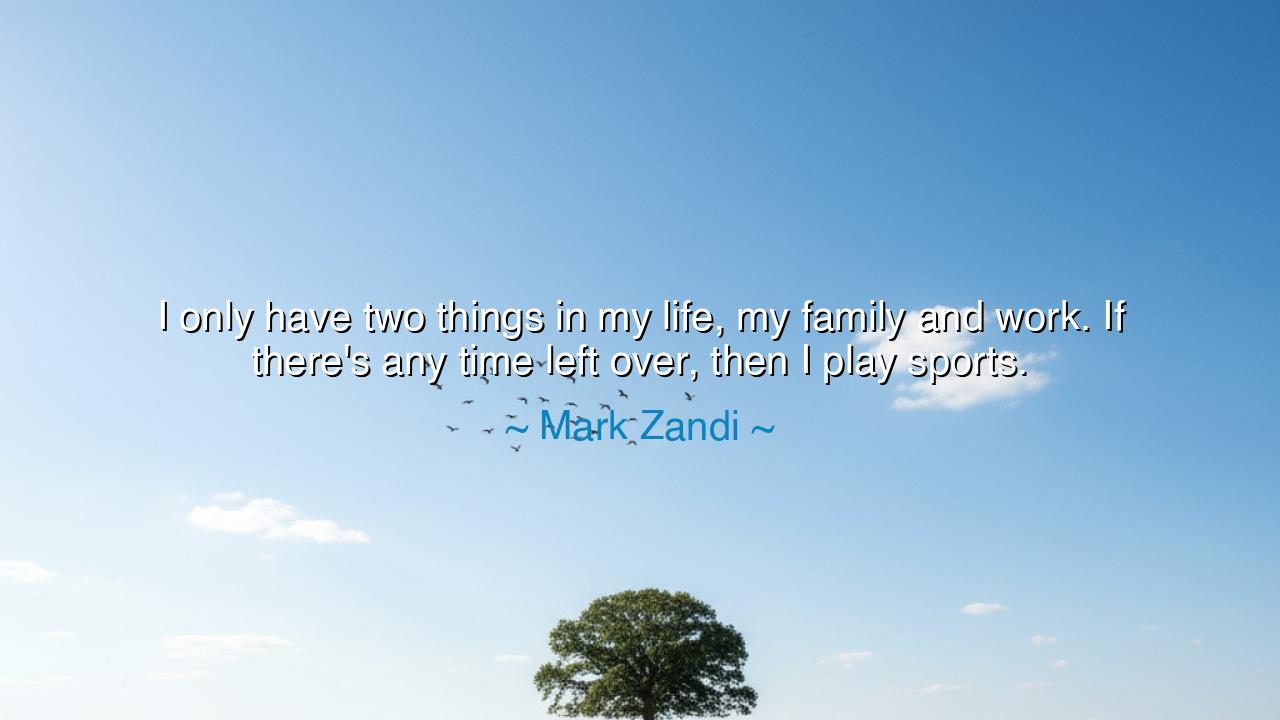
I only have two things in my life, my family and work. If
I only have two things in my life, my family and work. If there's any time left over, then I play sports.






"I only have two things in my life, my family and work. If there's any time left over, then I play sports." Thus spoke Mark Zandi, a man of discipline and clarity, who lays bare the hierarchy of his life with the precision of a craftsman. His words remind us of the eternal balance that every soul must strike: between duty and devotion, between labor and love, between the bonds that sustain us and the labors that define us. In these few lines, there is both simplicity and greatness—the structure of a life well-ordered.
First, he places family at the heart of all things. For what is work without loved ones to return to? What is success without those who rejoice in it with you? Family is the soil in which the roots of a man grow, the harbor to which he returns when the storms of the world rage. Zandi reminds us that even the greatest triumph in the world of labor is hollow without the warmth of kin. By naming family first, he proclaims where his true treasure lies.
Second, he names work. Not as a burden, but as a calling, a place where the self is tested, sharpened, and given purpose. To work is to give back to the world, to carve out meaning in the fabric of time. But note the order: family first, then work. For in this hierarchy lies wisdom—work sustains, but it must never replace the sacred bonds of love and blood. Many through history have reversed this order and discovered too late that no wealth or fame can heal a neglected family.
Third, and only then, comes sports—the games of leisure, the contests of strength and play. Zandi does not despise them; indeed, he acknowledges their joy and power. But he recognizes that they belong to the realm of “if there’s time left over.” Recreation is good, but it is not ultimate. It is spice, not bread; it is light, not foundation. This too is wisdom, for it teaches us to order our pleasures without letting them become our masters.
History bears witness to men who lived in such balance. Consider Cincinnatus, the Roman farmer who was called from his fields to serve as dictator in time of crisis. He did his duty, saved his people, and then returned to his family and his plow. He understood that greatness was not in endless ambition, but in fulfilling one’s roles faithfully, in order: family, duty, and then the lighter joys of life. Or think of George Washington, who after leading armies and a nation, longed most of all for the peace of Mount Vernon, with his household and his land.
The lesson is this: order your life by what matters most. Do not let recreation consume the time meant for love. Do not let ambition devour the hours meant for family. Know what is first, what is second, what is third, and guard that order with all your strength. In such clarity lies freedom, for the man who knows his priorities cannot be easily swayed by distraction or vanity.
Practical action must follow. Ask yourself: what are my two or three pillars? Name them, honor them, and build your life upon them. Let everything else flow around them like water around a rock. When you rise each day, give your time to the first and second pillars, and only then, if strength remains, to the third. In this way, your life will not be scattered but strong, not shallow but rooted.
Thus Mark Zandi, in his simple confession, gives us a structure for living. Family, work, then play. Let these priorities be the compass of our days, and we will not only endure but flourish, with love at our center, purpose in our labor, and joy as the crown of our toil.






AAdministratorAdministrator
Welcome, honored guests. Please leave a comment, we will respond soon